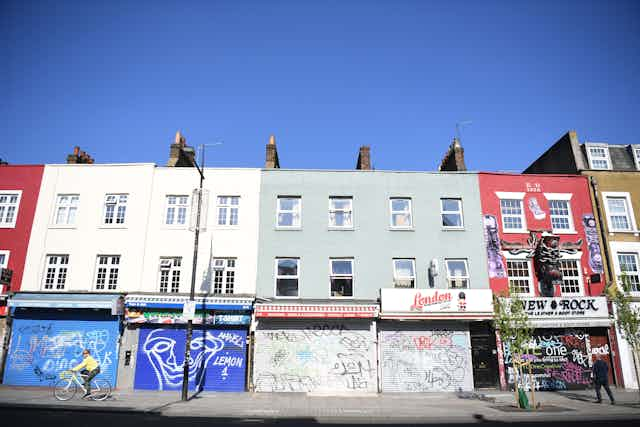A couple of days ago I was on the phone with Rajesh, a friend of mine (not his real name). Rajesh, 25, has just had to move back in with his parents. They had thrown him out of the house in Birmingham on learning he was gay. Despite a move to London, the job he had started no longer exists and with difficulty finding accommodation since the COVID-19 lockdown he has reluctantly had to move back, a situation he describes as “dire”. Rajesh’s story is far from unique.
Many LGBTQ people are being forced to move back into unsafe domestic spaces. Charities such as the Albert Kennedy Trust recently advised young people to “press pause” on coming out “until you get support”. While the crisis has raised significant concerns for everyone, it has brought additional barriers for LGBTQ people, especially those coming from BAME backgrounds who face disproportionate levels of homelessness. Insecure employment brings further levels of marginalisation.
The crisis has created an unprecedented situation which has seen many LGBT people isolated without any support structures. Several BAME LGBTQ people I have spoken to in the last few days have told me of their dread at having to move away from their families of choice – and sometimes back into old, hostile situations – as they are forced into isolation. LGBT people are significantly more susceptible to mental health issues due to discrimination and inequalities. This is only exacerbated through social isolation.
Read more: Coronavirus is hitting BAME communities hard on every front
Poverty and precarity
Elsewhere, LGBTQ activists and friends in India and Bangladesh who have been long time academic collaborators have cried to me over the phone about the uncertainty coronavirus is creating in their communities. Trans activists in particular are worried about how self-isolation could be a “death knell” for their community as people are cut off from their support structures and forced to remain under lockdown in hostile places.
My colleague Paul Boyce and I have conducted extensive research in small towns in West Bengal which revealed just how important kinship and friendship structures are for LGBTQ people, especially those living in rural or suburban areas where isolation is a significant issue. Several of them are also sex workers, and have described this as a life and death situation because of lack of pay and government support.
Raina Roy, an activist from the Sambhobana Trust, a trans advocacy and support group, told me about the horrible police brutality and housing insecurity facing trans people in West Bengal, which has been exacerbated by the lockdown. She, along with other local organisers, are fundraising to provide 250 trans people with a fixed monthly income of £22 for a period of three months – which could go some way in West Bengal.

Pawan Dhall of the Varta Trust, a gender and sexuality advocacy organisation in India, told me that queer activists and support groups have thrown themselves into helping others in the community who are facing survival challenges – from access to anti-retroviral therapy, food rations to care services. Dhall has started an audio blog where activists across eastern India have been sending updates. Such projects serve a triple function: health information is disseminated, a space is created for interaction, and the moment is archived.
Social isolation and social media
Beyond the obvious issues around income, housing and food, LGBTQ people are significantly more susceptible to mental health issues due to discrimination and inequalities. For those LGBTQ people moving back into unsafe spaces where they have to either go “back in the closet” or remain silent about their sexuality, the loss of being able to socialise with supportive queer friends and allies is very concerning.
Jack Harrison Quintana, director of Grindr for Equality (Grindr’s corporate social responsibility arm) points out that those in the west should look abroad, where there are examples of dating and hook up apps like Grindr being used for friendship and mutual support.
My own research in this area has argued that digital spaces can often be lifelines for LGBTQ youth. In the UK and in India there has been a significant increase in people calling up charity helplines for support. Advocacy and peer outreach work is taking place online now more than ever before, but more can be done.
While faith groups have been excellent in helping individuals and supporting community groups, LGBTQ people of colour continue to feel unable to access these resources due to fear of stigma and backlash. Anjum (not her real name), who lives in east London and is currently self-isolating, told me:
I am lucky to have faith groups in my area who have been coming round and buying essentials for me. I am always worried though how it would be if they found out about my sexuality. I don’t know many people in this city.
This is not the first time a virus has threatened the LBGTQ community. Most people will remember the AIDS crisis, which killed tens of thousands of people. While most government and health officials were too slow to respond, or deliberately obfuscated facts, it was the resilience of the LGBTQ community that got us through it: by coming together and taking to the streets to demand healthcare.
Loss and grief is not something new for my community – we have raged against oppression, celebrated in our victories and above all survived. This time it is different as there is no judgement on people infected. Even as we face this crisis together it is imperative to continue sharing resources and be conscious of those who might be more vulnerable than us.

